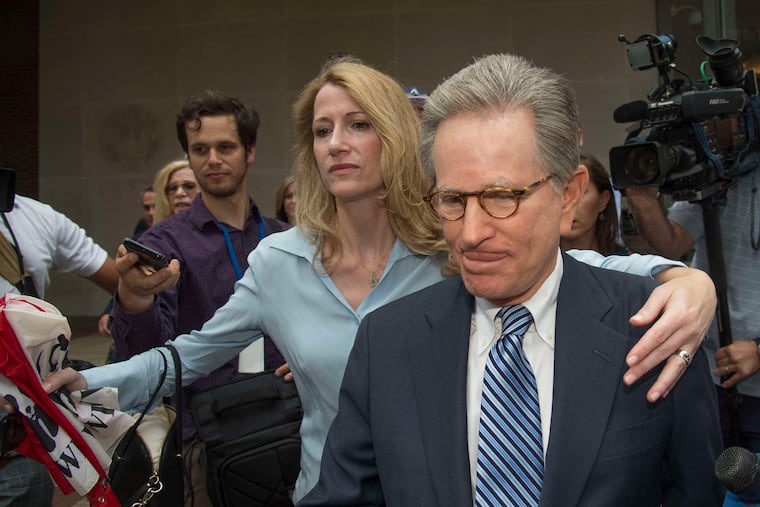Prison officials told former Philly deputy mayor he’d be released early due to pandemic — then reversed course
In a reversal that has caused chaos for dozens of federal inmates and sowed confusion between wings of the executive branch, U.S. prison administrators reversed several earlier release decisions this week and said they would no longer consider inmates who had served less than half their terms.

On April 14, former Philadelphia Deputy Mayor Herbert Vederman was told he had been selected for early release amid the coronavirus pandemic, along with most of his fellow inmates at the minimum-security prison camp in upstate New York where he is serving a sentence for his conviction in the political corruption case that brought down U.S. Rep. Chaka Fattah.
Vederman moved to a medium-security lockup to serve out a 14-day quarantine period and was eagerly counting down the days until he could finish the rest of his two-year term under confinement at his home in West Palm Beach, Fla.
But on Monday — one week before 74-year-old’s scheduled departure — the U.S. Bureau of Prisons reversed course.
In a decision that has caused chaos for dozens of federal inmates and their families, and sowed confusion among wings of the executive branch, U.S. prison administrators revoked several of their earlier release decisions this week and said they would no longer consider inmates who had served less than half of their sentences.
The decision has left inmates like Vederman — who is just two months shy of that benchmark — in limbo.
» READ MORE: Deal to end ex-Philly deputy mayor’s bribery case with one-year sentence crumbles in court
Vederman, who earned his fortune as an executive with the Charming Shoppes women’s clothing chain before taking prominent roles in the mayoral and gubernatorial administrations of Ed Rendell, was convicted in 2016 of showering Fattah with bribes for years, including gifts such as cash payments to the congressman’s children and college tuition for his South African au pair.
Fattah, in exchange, lobbied government officials — including then-President Barack Obama and U.S. Sen. Bob Casey (D., Pa.) — in hope of landing Vederman a post as an ambassador.
An appellate court later overturned Fattah’s bribery convictions, but Vederman was sentenced last year on charges of bank fraud and false statements tied to $18,000 he paid Fattah in 2012 that they tried to hide by arranging a sham sale of a Porsche owned by the Democratic congressman’s wife, former NBC10 news anchor Renee Chenault-Fattah.
The confusion this week over whether Vederman would be released from prison comes nearly a month after Attorney General William Barr first ordered a review to determine which among the nation’s nearly 144,000 federal inmates could safely be furloughed to house arrest as coronavirus outbreaks in federal prisons nationwide began to threaten the lives of inmates and guards.
More recently, he has directed the Bureau of Prisons to move more aggressively and expanded the criteria under which inmates could be released, urging the agency to prioritize low-risk offenders and those with health-risks who have already served half their sentences.
Roughly 1,400 have already been selected for furlough as of Wednesday, the bureau reported on its website. Before Monday, those numbers had not only included Vederman, but also other high-profile federal inmates including President Donald Trump’s former campaign chairman, Paul Manafort, and his personal lawyer Michael Cohen, according to various news reports.
What exactly changed this week remains unclear.
Inmates whose release decisions were reversed were told by prison officials that the Justice Department had issued new guidelines. But in Vederman’s case, government lawyers say the department’s guidance had not changed.
The mandate to prioritize those who had completed half their prison terms is “subject to deviation in BOP’s discretion based on particular circumstances,” Assistant U.S. Attorney Robert Zauzmer wrote in a court filing Wednesday. “Mr. Vederman’s case will be assessed consistent with this policy.”
In a statement to Forbes, a Bureau of Prisons spokesperson said the decision to move inmates from the minimum-security camp in Otisville, N.Y., where both Vederman and Cohen are housed, into pre-release quarantine earlier this month was merely an anticipatory step and was not meant to guarantee their eventual release.
“Staff at Otisville are currently reviewing all inmates for their suitability for home confinement or furlough,” the statement read. “Some of these inmates may not ultimately qualify, but by proactively moving the inmates into quarantine now, eligible inmates will be able to be released from the institution sooner.”
Vederman’s lawyers say that can’t afford to wait and have now asked the U.S. Court of Appeals for the Third Circuit to step in.
» HELP US REPORT: Are you a health care worker, medical provider, government worker, patient, frontline worker or other expert? We want to hear from you.
They cited their client’s advanced age and health conditions such as heart disease and a bout with skin cancer that could make him more medically vulnerable should he contract the virus.
“To be clear, Vederman is not asking the court to reduce his prison sentence,” attorney Yaakov M. Roth wrote in a court filing Tuesday. “Rather, he implores the court to allow him to remain at home — just as the BOP itself was poised to do, until [its] last-minute reversal of policy — until the court can resolve his appeal.”
He could receive an answer as soon as Thursday during a previously scheduled hearing before the appellate court, where his lawyers were already set to urge a panel of judges to overturn his sentence.
Vederman’s lawyers did not return requests for comment Wednesday. Lawyers for Fattah, who is serving a 10-year sentence at a federal prison in Wayne County, Pa., did not respond to questions over whether he, too, had sought early release.